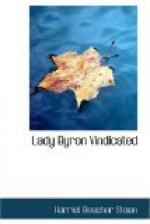have admitted Peter as well as Luke or Barnabas . . . .
’Ross gave us an excellent sermon, yesterday, on “Hallowing the Name.” Though far from commonplace, it might have been delivered in any church.
’We have had Fanny Kemble here last week. I only heard her “Romeo and Juliet,”—not less instructive, as her readings always are, than exciting; for in her glass Shakspeare is a philosopher. I know her, and honour her, for her truthfulness amidst all trials.’
* * * * *
LADY BYRON TO H. C. R.
’BRIGHTON, March 5, 1855.
’I recollect only those passages of Dr. Kennedy’s book which bear upon the opinions of Lord Byron. Strange as it may seem, Dr. Kennedy is most faithful where you doubt his being so. Not merely from casual expressions, but from the whole tenor of Lord Byron’s feelings, I could not but conclude he was a believer in the inspiration of the Bible, and had the gloomiest Calvinistic tenets. To that unhappy view of the relation of the creature to the Creator, I have always ascribed the misery of his life . . . . It is enough for me to remember, that he who thinks his transgressions beyond forgiveness (and such was his own deepest feeling) has righteousness beyond that of the self-satisfied sinner, or, perhaps, of the half-awakened. It was impossible for me to doubt, that, could he have been at once assured of pardon, his living faith in a moral duty, and love of virtue ("I love the virtues which I cannot claim"), would have conquered every temptation. Judge, then, how I must hate the creed which made him see God as an Avenger, not a Father! My own impressions were just the reverse, but could have little weight; and it was in vain to seek to turn his thoughts for long from that idee fixe with which he connected his physical peculiarity as a stamp. Instead of being made happier by any apparent good, he felt convinced that every blessing would be “turned into a curse” to him. Who, possessed by such ideas, could lead a life of love and service to God or man? They must, in a measure, realize themselves. “The worst of it is, I do believe,” he said. I, like all connected with him, was broken against the rock of predestination. I may be pardoned for referring to his frequent expression of the sentiment that I was only sent to show him the happiness he was forbidden to enjoy. You will now better understand why “The Deformed Transformed” is too painful to me for discussion. Since writing the above, I have read Dr. Granville’s letter on the Emperor of Russia, some passages of which seem applicable to the prepossession I have described. I will not mix up less serious matters with these, which forty years have not made less than present still to me.’
* * * * *
LADY BYRON TO H. C. R.
’BRIGHTON, April 8, 1855.




